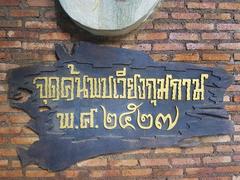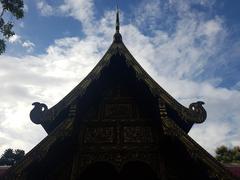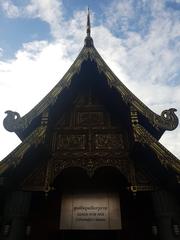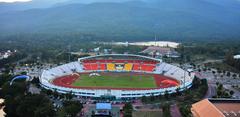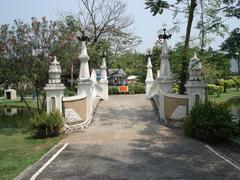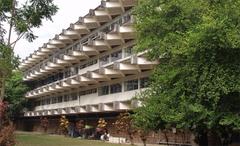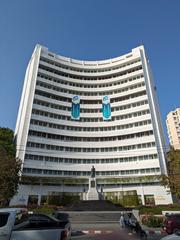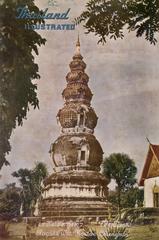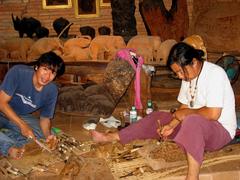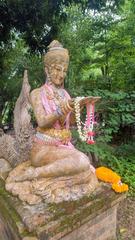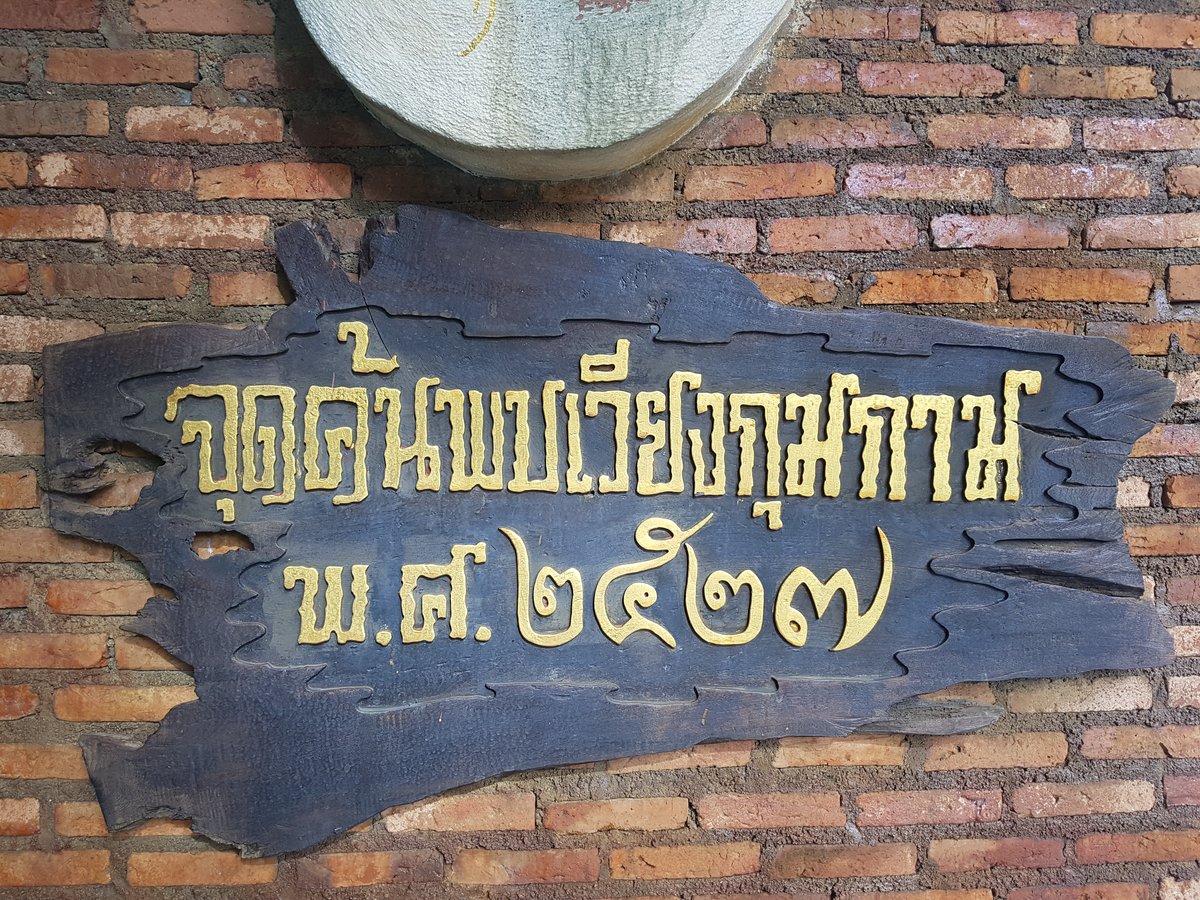
Visiting Wiang Kum Kam Information Center: Hours, Tickets, and Tips
Date: 23/07/2024
Introduction
Wiang Kum Kam, an ancient city nestled in the Ping River basin of Mueang Chiang Mai, Thailand, offers visitors a captivating glimpse into the history and culture of the Lanna Kingdom. Established in the late 13th century by King Mangrai, the founder of the Lanna Kingdom, Wiang Kum Kam served as the capital before the establishment of Chiang Mai. Its strategic location along the Ping River facilitated early trade and communication, contributing to its prosperity. Rediscovered in the 1980s, the site has since become a focal point for historians and tourists alike, with extensive archaeological excavations revealing numerous artifacts, pottery, inscriptions, and religious structures (Chiang Mai Citylife).
Wiang Kum Kam’s historical significance is underscored by its numerous temples and monuments adorned with intricate carvings and murals, reflecting the rich cultural heritage of the region. The city’s decline, attributed to severe flooding in the 16th century, led to its eventual abandonment. However, modern restoration efforts by the Thai Fine Arts Department have preserved this cultural treasure for future generations. The Wiang Kum Kam Information Center serves as a gateway for visitors, providing detailed insights into the site’s history and significance (UNESCO, Fine Arts Department of Thailand).
This comprehensive guide aims to provide everything you need to know about visiting Wiang Kum Kam, from historical background and cultural significance to practical visitor information such as ticket prices, opening hours, travel tips, and nearby attractions. Whether you’re a history enthusiast or a casual traveler, Wiang Kum Kam offers a unique and enriching experience that highlights the ingenuity and resilience of the Lanna people (Tourism Authority of Thailand).
Table of Contents
- [Historical Background of Wiang Kum Kam](#historical-background-of-wiang-kum-kamhistorical-background-of-wiang-kum-kam)
- [Origins and Establishment](#origins-and-establishmentorigins-and-establishment)
- [Archaeological Discoveries](#archaeological-discoveriesarchaeological-discoveries)
- [Flooding and Abandonment](#flooding-and-abandonmentflooding-and-abandonment)
- [Restoration Efforts](#restoration-effortsrestoration-efforts)
- [Cultural Significance](#cultural-significancecultural-significance)
- [Historical Records and Inscriptions](#historical-records-and-inscriptionshistorical-records-and-inscriptions)
- [Religious and Spiritual Importance](#religious-and-spiritual-importancereligious-and-spiritual-importance)
- [Visitor Information](#visitor-informationvisitor-information)
- [Tickets and Visiting Hours](#tickets-and-visiting-hourstickets-and-visiting-hours)
- [Travel Tips and Accessibility](#travel-tips-and-accessibilitytravel-tips-and-accessibility)
- [Nearby Attractions](#nearby-attractionsnearby-attractions)
- [Special Events and Guided Tours](#special-events-and-guided-toursspecial-events-and-guided-tours)
- [Cultural Significance and Modern-Day Relevance](#cultural-significance-and-modern-day-relevancecultural-significance-and-modern-day-relevance)
- [Preservation Efforts and Challenges](#preservation-efforts-and-challengespreservation-efforts-and-challenges)
- [Educational Initiatives](#educational-initiativeseducational-initiatives)
- [Frequently Asked Questions](#frequently-asked-questionsfrequently-asked-questions)
- [Conclusion](#conclusionconclusion)
Historical Background of Wiang Kum Kam
Origins and Establishment
Wiang Kum Kam, an ancient city located in the Ping River basin, was established in the late 13th century by King Mangrai, the founder of the Lanna Kingdom. The city served as the capital of the Lanna Kingdom before the establishment of Chiang Mai. The strategic location of Wiang Kum Kam along the Ping River facilitated trade and communication, contributing to its early prosperity. Historical records indicate that the city was a thriving hub of culture and commerce during its peak (Chiang Mai Citylife).
Archaeological Discoveries
The rediscovery of Wiang Kum Kam in the 1980s marked a significant milestone in the understanding of Northern Thailand’s history. Archaeological excavations have unearthed numerous artifacts, including pottery, inscriptions, and religious structures, providing insights into the city’s past. Notable discoveries include the remnants of Wat Chedi Liam, a temple with a distinctive five-tiered chedi, and Wat Chang Kham, known for its elephant sculptures (Thai National Archives).
Flooding and Abandonment
The decline of Wiang Kum Kam is attributed to severe flooding caused by the Ping River’s changing course. Historical accounts suggest that the city was repeatedly inundated, leading to its eventual abandonment in the 16th century. The floods not only displaced the inhabitants but also buried the city under layers of sediment, preserving it for future generations to uncover (UNESCO).
Restoration Efforts
In recent decades, significant efforts have been made to restore and preserve Wiang Kum Kam. The Thai Fine Arts Department has played a crucial role in these initiatives, conducting extensive excavations and conservation projects. The establishment of the Wiang Kum Kam Information Center serves as a focal point for these efforts, providing visitors with detailed information about the site’s history and significance (Fine Arts Department of Thailand).
Cultural Significance
Wiang Kum Kam holds immense cultural significance as a testament to the ingenuity and resilience of the Lanna people. The city’s architectural and artistic achievements reflect the rich cultural heritage of the region. The temples and monuments of Wiang Kum Kam are adorned with intricate carvings and murals, showcasing the artistic prowess of the Lanna craftsmen. The site also serves as a reminder of the challenges faced by ancient civilizations in adapting to environmental changes (Lanna Cultural Center).
Historical Records and Inscriptions
The inscriptions found at Wiang Kum Kam provide valuable insights into the city’s history and governance. These inscriptions, written in ancient Lanna script, document various aspects of daily life, including trade, religion, and administration. One notable inscription, found at Wat E-Kang, details the construction of a canal system to manage the city’s water supply, highlighting the advanced engineering skills of the Lanna people (Chiang Mai University).
Religious and Spiritual Importance
Wiang Kum Kam was not only a political and economic center but also a significant religious site. The city was home to numerous temples and monasteries, serving as centers of spiritual and educational activities. The presence of these religious institutions underscores the importance of Buddhism in the daily lives of the Lanna people. The temples of Wiang Kum Kam continue to attract pilgrims and tourists, offering a glimpse into the spiritual heritage of the region (Buddhist Studies Center).
Visitor Information
Tickets and Visiting Hours
Visitors to Wiang Kum Kam can explore the ancient city’s ruins through guided tours offered by the Information Center. These tours provide a comprehensive overview of the site’s history, architecture, and cultural significance. The Wiang Kum Kam Information Center is open daily from 8:30 AM to 5:00 PM. Tickets are available for purchase on-site, with prices varying for adults and children. Special group rates and guided tour packages are also available (Wiang Kum Kam Information Center).
Travel Tips and Accessibility
Wiang Kum Kam is easily accessible from Chiang Mai, located just a few kilometers south of the city. Visitors can reach the site by car, taxi, or bicycle. The Information Center provides maps and information on the best routes to take. The site is relatively flat, making it accessible for visitors of all ages and physical abilities. Comfortable walking shoes, sunscreen, and water are recommended for a pleasant visit.
Nearby Attractions
While visiting Wiang Kum Kam, travelers can also explore nearby attractions such as the ancient city of Chiang Mai, Wat Phra Singh, and the Chiang Mai Night Bazaar. These sites offer additional insights into the region’s rich history and vibrant culture, making for a comprehensive cultural experience.
Special Events and Guided Tours
Wiang Kum Kam hosts special events throughout the year, including traditional Lanna festivals, cultural performances, and educational workshops. Guided tours are available in multiple languages, providing in-depth knowledge about the site’s history and significance. Visitors are encouraged to check the Information Center’s website for the latest updates on events and tours (Tourism Authority of Thailand).
Cultural Significance and Modern-Day Relevance
Today, Wiang Kum Kam stands as a symbol of historical resilience and cultural continuity. The ongoing preservation efforts ensure that future generations can learn from and appreciate the rich history of the Lanna Kingdom. The Wiang Kum Kam Information Center plays a pivotal role in this endeavor, providing educational resources and guided tours to enhance visitors’ understanding of the site’s historical significance (Tourism Authority of Thailand).
Preservation Efforts and Challenges
Despite the extensive restoration efforts, Wiang Kum Kam faces ongoing challenges in preservation. Environmental factors, such as flooding and erosion, continue to pose threats to the site’s integrity. Additionally, the increasing number of visitors necessitates careful management to prevent damage to the fragile ruins. The Thai government, in collaboration with international organizations, is actively working to address these challenges and ensure the long-term preservation of Wiang Kum Kam (International Council on Monuments and Sites).
Educational Initiatives
The Wiang Kum Kam Information Center also serves as an educational hub, offering workshops and seminars on the history and archaeology of the site. These initiatives aim to foster a deeper understanding and appreciation of the Lanna cultural heritage among students, researchers, and the general public. Collaborative projects with universities and research institutions further contribute to the ongoing study and preservation of Wiang Kum Kam (Chiang Mai University).
Frequently Asked Questions
What are the visiting hours for Wiang Kum Kam?
The Wiang Kum Kam Information Center is open daily from 8:30 AM to 5:00 PM.
How much are the tickets to Wiang Kum Kam?
Tickets are available for purchase on-site, with prices varying for adults and children. Special group rates and guided tour packages are also available.
Are there guided tours available?
Yes, guided tours are available in multiple languages, providing comprehensive insights into the site’s history and significance.
Conclusion
Wiang Kum Kam stands as a testament to the resilience and cultural richness of the Lanna Kingdom. From its establishment to its rediscovery, the city offers valuable lessons in history and cultural preservation. Visit Wiang Kum Kam to explore this historical gem and download our mobile app Audiala for more insights and updates.
References
- Discover Wiang Kum Kam - History, Visiting Hours, Tickets, and More, 2024, Chiang Mai Citylife source
- Discover Wiang Kum Kam - History, Visiting Hours, Tickets, and More, 2024, Thai National Archives source
- Discover Wiang Kum Kam - History, Visiting Hours, Tickets, and More, 2024, UNESCO source
- Discover Wiang Kum Kam - History, Visiting Hours, Tickets, and More, 2024, Fine Arts Department of Thailand source
- Discover Wiang Kum Kam - History, Visiting Hours, Tickets, and More, 2024, Lanna Cultural Center source
- Discover Wiang Kum Kam - History, Visiting Hours, Tickets, and More, 2024, Chiang Mai University source
- Discover Wiang Kum Kam - History, Visiting Hours, Tickets, and More, 2024, Buddhist Studies Center source
- Discover Wiang Kum Kam - History, Visiting Hours, Tickets, and More, 2024, Wiang Kum Kam Information Center source
- Discover Wiang Kum Kam - History, Visiting Hours, Tickets, and More, 2024, Tourism Authority of Thailand source
- Ultimate Guide to Visiting Wiang Kum Kam Information Center - Hours, Tickets, and Tips, 2024, Tourism Authority of Thailand source
- Ultimate Guide to Visiting Wiang Kum Kam Information Center - Hours, Tickets, and Tips, 2024, Wiang Kum Kam Information Center source
- Exploring Wiang Kum Kam - History, Tickets, Visiting Hours, and More in Chiang Mai, 2024, Tourism Authority of Thailand source
